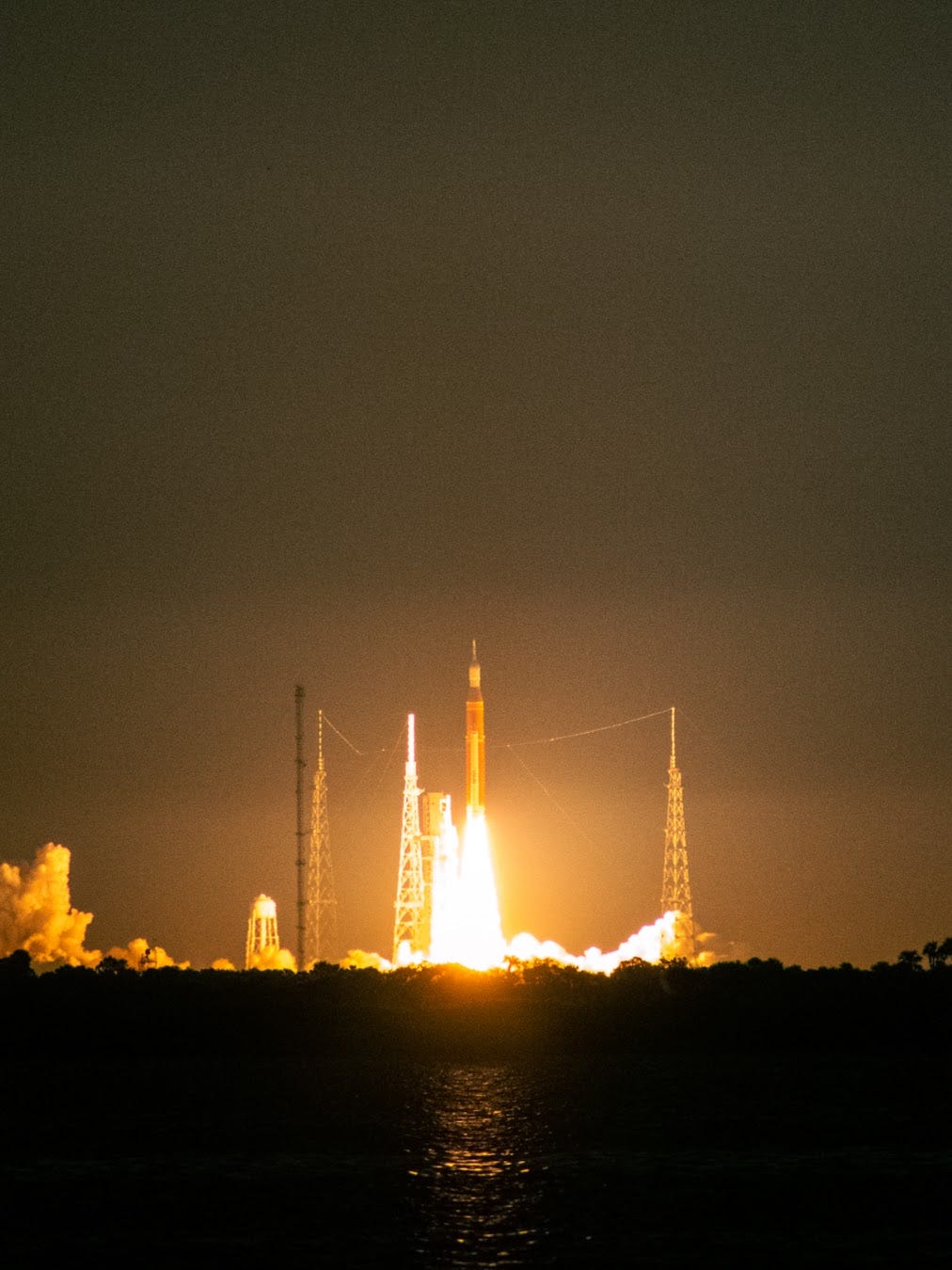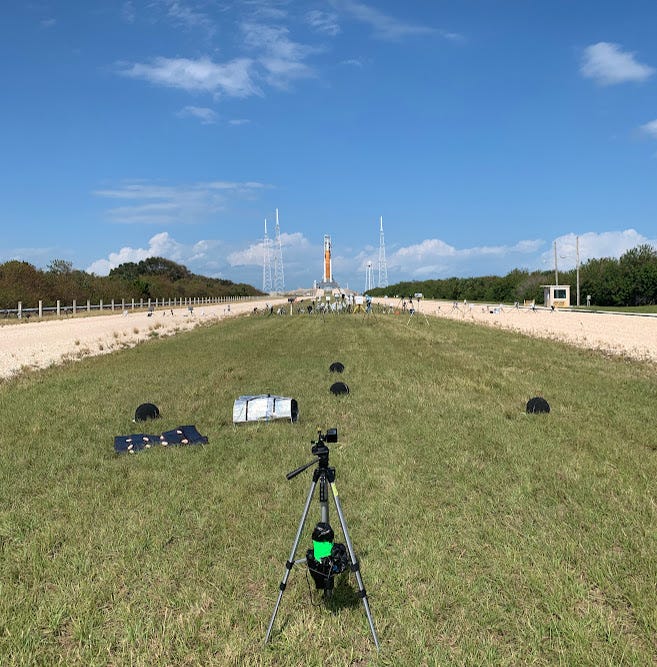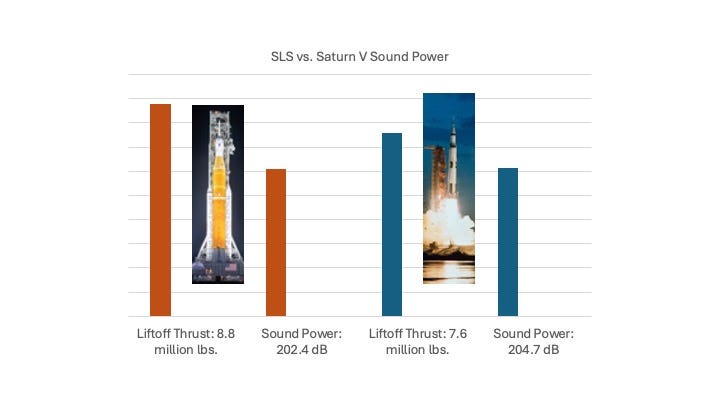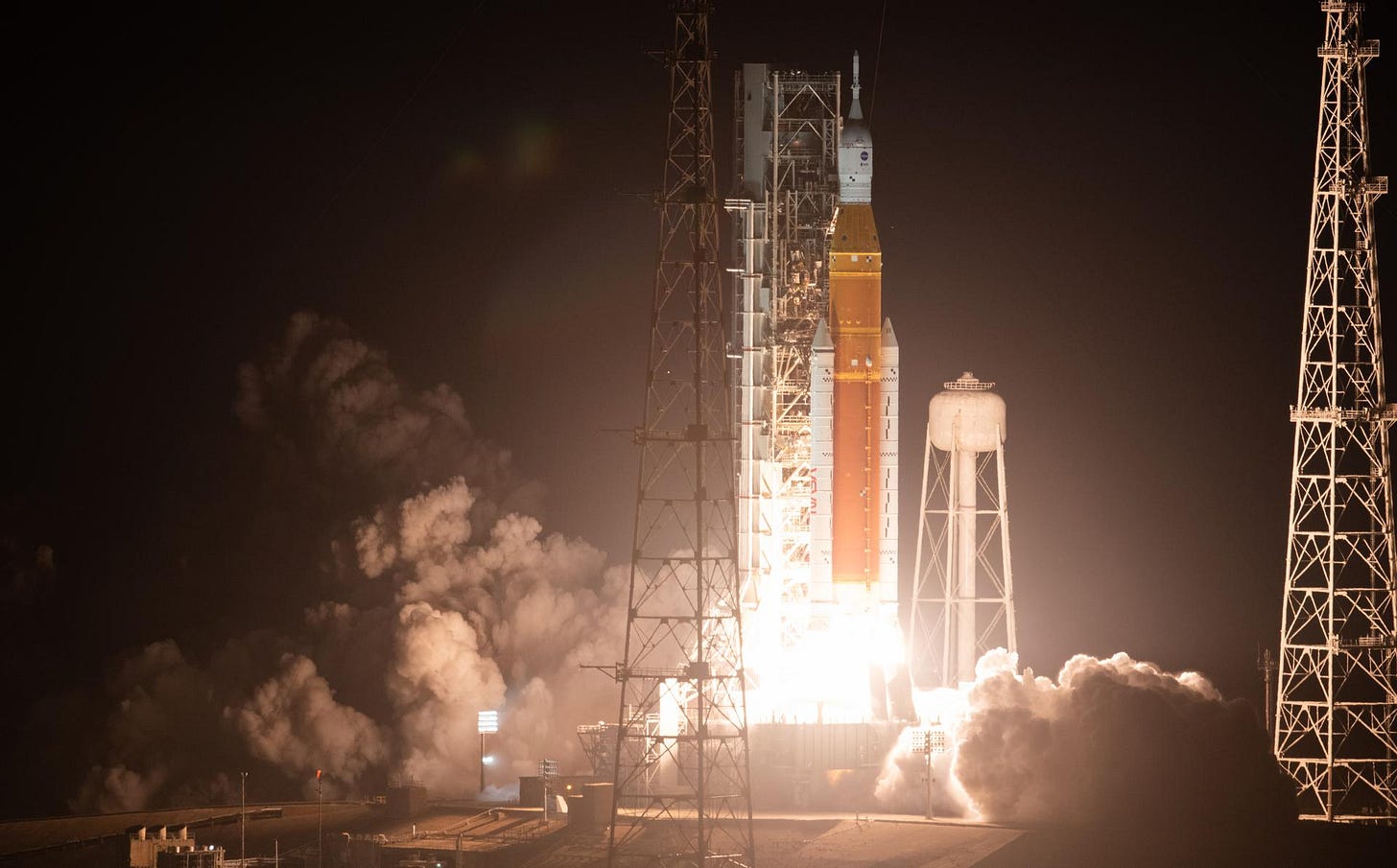SLS vs. Saturn V: Which was Louder?
And how do they compare to a fresh bowl of Rice Krispies®? 🥣

If you’ve ever been in person to a rocket launch, you know that rockets are LOUD. So loud that even from viewpoints miles away you can feel the raw power of the rocket as it lights its engines and ascends up through the atmosphere. This acoustic energy (meaning energy in the form of sound waves) is actually so intense that it can damage the rocket itself, harm its payload, and impact the surrounding environment and community. Rocket acoustics is a field of growing importance as more and more launches take place at more locations around the world, and it is a problem that many future aerospace engineers will have to take on.
Some rockets are louder than others. The Saturn V launch vehicle was NASA’s rocket that launched astronauts to the moon during the Apollo program in the 1960s and 1970s, and it is considered one of mankind’s great engineering accomplishments. It was such an impressively powerful vehicle that online claims started to circulate that the rocket’s acoustic energy could “melt concrete,” “light grass ablaze over a mile away,” or even “ignite the hair of bystanders” and (my personal favorite) “blast rainbows from the sky.” 🌈
These claims are all false (reference), but they also speak to the awe-inspiring power of the Saturn V and the intense sound levels produced by the rocket. However, given that the recent launch of NASA’s Space Launch System (or SLS for short, the rocket that will take our generation to the moon) produced 15% more thrust at liftoff than the Saturn V (8.8 million pounds for SLS vs. 7.6 million pounds for the Saturn V), we naturally ask the question “which rocket was louder?” Keep your answer in mind, as the science behind it might go against your intuition.
Fortunately, researchers from my former lab at BYU and Rollins College have exactly the data and expertise to answer this question for us, as we were present for the launch of SLS in 2022.

Thanks to the cooperation and support of NASA personnel, we were able to set up several acoustic recording stations near SLS and around Cape Canaveral. These scientific-grade microphones were custom-designed for the unique spectrum of rocket acoustics, which are loudest in the infrasound regime (frequencies <20 Hz, lower than the human ear can hear). We were also able to watch the launch of SLS from about 10 miles away, and even at that distance from the rocket, I could feel its power as it lit up the sky like a sunrise and ascended up through the atmosphere. For more information on the setups and preliminary results of this effort, see this reference.
So, given that SLS was the most powerful rocket to ever launch successfully (Starship hadn’t launched at this point in 2022), was it louder than the Saturn V? 🚀
A recent publication in JASA-EL (reference) compared the acoustic data collected by the team at the SLS launch to a historical sound power spectrum from the Saturn V (sound power is a quantity that is independent of distance from the sound source). The results? The Saturn V was at least 2 dB louder than SLS and about twice as acoustically efficient. This means that although SLS was more powerful, the Saturn V converted about twice as much mechanical power into acoustical power.

The sound power produced by SLS (202.4 dB) is still extremely loud. We compared the launch noise levels recorded at 5 km away from the rocket to the sound levels of a fresh bowl of crackling Rice Krispies® and found that SLS’s noise intensity at this distance from the rocket was approximately 40 million times greater than the crackling of cereal. If this comparison only leaves you more confused, you can think of it being about as loud as operating a chainsaw (but with the rocket over 5 km away).
So, rockets are loud, but why should an aspiring aerospace engineer care? Well, there are many, but here are the main three in my mind: 👇
The number of orbital launch attempts per year is higher than it ever has been and is expected to continue to grow throughout the next several years. Loud rocket launches will go from a “cool” experience local residents get to experience a few times a year to a continual annoyance similar to an airport. Plus, imagine the sound levels of Starship (hope to have that data soon!) as it launches or lands near you.
As mentioned at the start of the article, rocket launch acoustics can be so intense that the sound waves damage the vehicle, its payload, and the launch pad infrastructure. This is why launch facilities flood the pad with water moments before takeoff - to absorb some of that acoustic energy and prevent it from damaging vulnerable structures. In fact, 60% of satellite failures on the first day of operation are due to excessive noise levels in the payload bay. This is why 40% of a satellite’s mass is solely to help it survive the launch vibrations (reference).
Rocket launch acoustics can also have severe detrimental impacts on the wildlife near the launch pad (see this Nature article on the topic). Many launch sites are in remote locations with vulnerable wildlife. For example, many of the rocket launches I measured during my undergraduate years were at Vandenberg Space Force base, which is home to endangered species like the Monarch butterfly, snowy plover, and the unarmored three-spine stickleback. The intense noise from nearby rocket launches has the potential to significantly disrupt these sensitive species, especially as rocket launches become more common.
So if you consider yourself someone interested in noise, satellites, rocket structures, or three-spine sticklebacks, rocket launch acoustics is going to be an important and growing field with funding from many different sources. Governments are interested in characterizing launch noise for military and defense purposes, commercial space companies are interested in saving their launch pads and payloads from noise damage, academic institutions are interested in the physics behind rocket acoustics, and spaceports are interested in mitigating the impact on wildlife. It could be time for you to take that acoustics class and start mastering the fundamentals of rocket acoustics so that you can “make some noise” in your career.
Find this content useful? Have feedback? Send us an email at admin@theoverview.org or reach out on any of our socials.
Stellar vibes,
-Tagg




Love this Taggart. These analyses and comparisons are always fun!